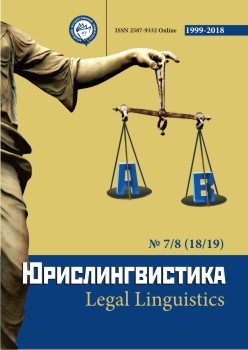GRAMMATICAL AND SYSTEM-BASED APPROACHES TO INTERPRETING THE LAW: THE NATURE OF INTERACTION
Abstract
The article covers the nature and significance of the grammatical approach to interpreting the law and points out its primary role in interpreting legal texts. Grammatical interpretation has a complex structure. On closer examination, the verbal layer of the law proves to consist of, at least, several components such as lexical, syntactic, logical and stylistic. The basic, i.e. lexical component is clarified with “the golden rule” of grammatical interpretation: firstly, words and expressions should be assigned the meaning implied by a statutory instrument; secondly, in the absence of a legal definition, we should rely upon common professional (special) practice of the word usage; otherwise, we should apply to explanatory dictionaries of the Russian language (i.e. to a common meaning). Regardless of all significance of the grammatical interpretation, examples from the current legislation of the Russian Federation substantiate its lack of instruments that prevents an interpreter from going beyond the verbal layer of an interpreted law. An interpreter aided with a mere grammatical approach has neither desire nor is ability to go beyond the particular syntactically completed utterance. Such lack of instruments in grammatical interpretation should be tackled by other approaches to interpretation. First of all, it is the system-based approach that enables addressing the over-regulatory level. Unlike grammatical interpretation, the system-based approach is able to interpret not only the initial regulation but also other related regulations. System-based interpretation relies on the presumption of a logical unity of law and its meaning integrity is achieved due to the system saving function of interpretation.
Downloads
Metrics
References
Иеринг Р. Дух римского права на различных ступенях его развития. Санкт-Петербург, 1875.
Люблинский П. И. Техника, толкование и казуистика уголовного кодекса. Петроград, 1917.
Смирнов А. В., Манукян А. Г. Толкование норм права. Москва, 2008.
Толстик В. А., Дворников Н. Л., Каргин К. В. Системное толкование норм права. Москва, 2010.
Фарбер И. Е. О сущности права. Саратов, 1959.
REFERENCES
Jhering R. The Spirit of the Roman Law at the Various Stages of Its Development [Dukh rimskogo prava na razlichnykh stupenyakh yego razvitiya]. St. Petersburg, 1875.
Lyublinskiy P. I. Technique, Interpretation and Casuistry of the Criminal Code [Tekhnika, tolkovaniye i kazuistika ugolovnogo kodeksa]. Petrograd, 1917.
Smirnov A. V., Manukyan A. G. Interpretation of Law [Tolkovaniye norm prava]. Moscow, 2008.
Tolstik V. A., Dvornikov N. L., Kargin K. V. System Interpretation of Law [Sistemnoye tolkovaniye norm prava]. Moscow, 2010.
Farber I. Ye. About the Essence of Law [O sushchnosti prava]. Saratov, 1959.
Copyright (c) 2018 Юрислингвистика

This work is licensed under a Creative Commons Attribution 4.0 International License.
The authors, which are published in this journal, agree to the following conditions:
1. Authors retain the copyright to the work and transfer to the journal the right of the first publication along with the work, at the same time licensing it under the terms of the Creative Commons Attribution License, which allows others to distribute this work with the obligatory indication of the authorship of this work and a link to the original publication in this journal .
2. The authors retain the right to enter into separate, additional contractual agreements for the non-exclusive distribution of the version of the work published by this journal (for example, to place it in the university depository or to publish it in a book), with reference to the original publication in this journal.
3. Authors are allowed to post their work on the Internet (for example, in a university repository or on their personal website) before and during the review process of this journal, as this may lead to a productive discussion, as well as more links to this published work (See The Effect of Open Access).











